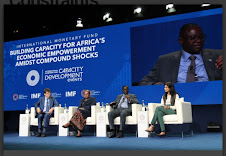Sierra Leone’s Minister of Finance, Sheku Ahmed Fantamadi Bangura, made a compelling call for urgent global action to combat rising inequality during the 2023 IMF/World Bank Annual Meeting held in the picturesque city of Marrakech, Morocco on Monday October 16, 2023.
This high-profile event brought together a diverse assembly of up to 14,000 delegates representing 190 countries, including Central Bankers, Finance and Development Ministers, private sector leaders, Civil Society representatives, members of the media, and academics. The discussions at the meeting encompassed crucial global topics, such as the state of the world economy, international financial stability, and poverty alleviation.
The gathering’s central focus was twofold: the strategies required to eradicate poverty while preserving a sustainable planet and addressing the interlinked global challenges. It also offered an invaluable platform for the IMF and World Bank to respond to mounting criticisms about the underrepresentation of poorer nations within these institutions and to explore reform measures that would better aid vulnerable nations in tackling poverty and climate change.
Minister Bangura delivered his speech as part of a high-level panel discussion titled, “Closing the Divide: Strengthening World Bank Goals to Fight Inequality.” He emphasized that addressing inequality is a complex and gradual process, asserting that meaningful change in this realm does not occur overnight. He outlined the Sierra Leone Government’s strategy, which includes a strong emphasis on education to foster human capital development and increased investments in the agriculture sector.
Minister Bangura also underscored the Government’s commitment to protect its most vulnerable citizens through a revamped tax policy that includes broad-based taxation and exemptions for essential services. He affirmed the Government’s active engagement in various social interventions, with a particular focus on women and youth, aiming to narrow the inequality gap. The Minister called attention to the persistent disparities within and between countries.
Furthermore, Minister Bangura criticized the role of politicians’ aspirations in widening the divide between the affluent and the impoverished. He urged the adoption of bold measures to combat inequality and to closely monitor progress toward achieving Sustainable Development Goal 10 (SDG10).
A consortium of Governmental and Non-Governmental stakeholders, including Minister Bangura, emphasized the urgent global imperative to combat growing inequality and set more ambitious targets to create a more equitable world. Distinguished speakers in other sessions highlighted the importance of addressing inequality on multiple fronts.
In a separate discussion, Minister Bangura highlighted the increasing importance of capacity development in the context of tax and spending policies, emphasizing two critical factors for effective capacity development in Africa: absorptive capacity and financial constraints. Addressing these strategic aspects, he argued, could substantially contribute to Africa’s economic empowerment.
Speaking on the issue of financial constraints, the Minister acknowledged the cost implications of implementing certain reforms, including the potential need for additional investments. He cautioned that inadequate planning for these financial considerations could undermine the effectiveness of training and support programs. Minister Bangura stressed the crucial role of addressing absorptive capacity and financial constraints in promoting Africa’s economic development and resilience.
Minister Bangura revealed Sierra Leone’s intent to maintain its engagement with the International Monetary Fund (IMF) as the country’s three-year arrangement under the Extended Credit Facility (ECF) nears its conclusion after the eighth review. He anticipates a disbursement of approximately $20 million from the IMF upon the completion of this review. The minister reaffirmed Sierra Leone’s commitment to a sustained partnership with the IMF, continued efforts to secure financial support, and responsible debt management practices in the face of economic challenges and shocks.
The Sierra Leone delegation actively participated in discussions addressing global issues concerning Africa and other developing nations. These discussions revolved around debt management, development financing, and desired reforms from institutions such as the Bretton Woods institutions, aiming to enhance support for developing countries, especially in Africa.
During the one-week conference, the IMF took noteworthy steps to enhance Africa’s representation and influence within the institution. These actions included expanding the executive board from 24 to 25 members, thereby granting Africa an additional seat, and increasing contributions to the global lender. Sub-Saharan Africa secured a third seat on the IMF’s executive board, strengthening the continent’s voice within the organization.
Boosting the International Monetary Fund’s quota resources and affording Africa a more prominent role within the institution emerged as key priorities during the week-long deliberations of the IMF and World Bank in Marrakech.




